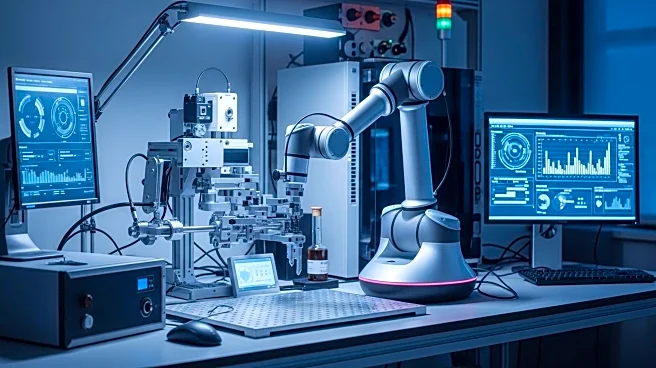What's Happening?
In anticipation of the American Society of Human Genetics (ASHG) annual meeting, several lab automation companies have announced new products and partnerships. SPT Labtech and Agilent have introduced automated target enrichment protocols on SPT Labtech's firefly®+ platform. These protocols are designed to support researchers using Agilent's SureSelect Max DNA Library Prep kits, optimized for various inputs and sample types, including FFPE and genomic DNA. This development aims to enhance genomic workflows in clinical research, oncology, and precision medicine. Additionally, Opentrons and BD have announced a multi-year collaboration to integrate Opentrons' robotic liquid-handling capabilities into BD's single-cell multiomics instruments. This partnership will automate critical experimental steps in disease research and drug development, offering early access opportunities to interested labs.
Why It's Important?
The introduction of these automated protocols and partnerships is significant for the field of genomics and precision medicine. By streamlining the preparation of DNA libraries and automating experimental steps, these advancements can accelerate research processes and improve the accuracy of genomic studies. This is particularly relevant for clinical research and oncology, where precision and efficiency are crucial. The collaboration between Opentrons and BD also highlights the growing trend of integrating robotics into laboratory settings, which can lead to more consistent and reliable results in disease research and drug development. These developments may benefit researchers and healthcare providers by reducing manual errors and increasing throughput.
What's Next?
The companies involved plan to offer early access opportunities for their new offerings to interested laboratories. This could lead to wider adoption of these technologies in research settings, potentially influencing future studies and innovations in genomics. As these automated systems become more prevalent, they may prompt further collaborations and technological advancements in the field. Researchers and labs that adopt these systems early may gain a competitive edge in their respective areas of study, potentially leading to breakthroughs in understanding genetic diseases and developing targeted therapies.
Beyond the Headlines
The integration of automation in genomic research raises ethical and practical considerations. As these technologies become more advanced, questions about data privacy, the accuracy of automated systems, and the potential for reduced human oversight may arise. Additionally, the increased reliance on automation could shift the skill set required for researchers, emphasizing the need for expertise in managing and interpreting automated systems. Long-term, these developments could lead to a transformation in how genomic research is conducted, with implications for education and workforce development in the scientific community.









